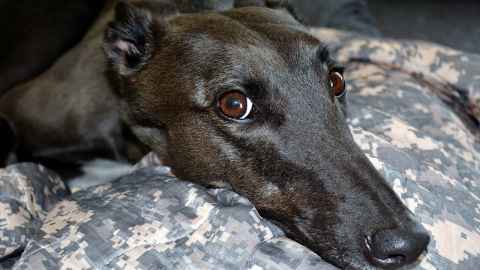Rehoming greyhounds no sure bet for animal welfare
14 June 2021
Opinion: Greyhound ‘rehoming’ is critical to the racing industry’s social licence, but how many ex-racing greyhounds can cope with expectations of them as pets.

Negative reports of greyhound racing in New Zealand have prompted Sport and Racing Minister Grant Robertson to launch a review into the practice, while MP Chloë Swarbrick is set to propose a private member’s bill that looks to ban it entirely.
Greyhound ‘rehoming’ - the practice of rehabilitating former racing dogs into pets once they are no longer of economic value to their owners and trainers - has become a critical component of the racing industry’s social licence, after consistent reports of adverse animal welfare since 2013.
While these reports have called for Greyhound Racing New Zealand (GRNZ) to increase rehoming opportunities, our study, in which we interviewed greyhound racing industry insiders and rehoming practitioners, suggests that rehoming might not offer a clear-cut solution to the welfare issues facing the greyhound racing industry.
As a breed, greyhounds have much to offer a family in want of a pet: they are low-energy, gentle in their interactions with people, and adaptable. Websites of rehoming agencies describe ex-racing greyhounds as affectionate, loyal and lazy companions (see, GAP.org.nz, GreyhoundTrust.org.uk, H.U.G.ie).
What isn’t readily communicated is how poorly equipped many ex-racing greyhounds are to cope with the expectations placed on them as pets.
Most racing greyhounds live in outdoor, single-occupancy kennels - in some cases, one insider informed us, for up to 23 hours a day. As a result, they miss out on their critical learning period and many lack the social skills necessary to integrate into family life: “They’re really damaged because of the lack of socialisation”, our participant explained. Others we spoke with voiced concerns about rehomed greyhounds living with chronic stress due to their inability to adapt to their new life.
Not all ex-racing greyhounds make it this far, however. Participants in our research expressed how there will always be greyhounds that aren’t suitable to be rehomed - they might have chronic health conditions, be too fearful to cope with a domestic environment, or have high levels of aggression towards people or other dogs.
Under New Zealand law, GRNZ can only encourage - not force - owners and trainers to give their unwanted greyhounds to a rehoming agency. The decision to enter the rehoming program is voluntary. What’s more, those greyhounds that have never been registered with GRNZ - that is, raced - will fly under GRNZ’s radar; owners and trainers will not have to account for their welfare or whereabouts.
According to one rehoming practitioner we interviewed, some of the “biggest trainers in New Zealand put no dogs into the greyhound adoption program”. The practitioner attributed this to a prioritisation of profit over welfare - there is a cost involved in housing a greyhound before it can be transported to a rehoming agency. It is more cost-effective to dispose of a greyhound as soon as it loses its economic value.
GRNZ does, however, have control over the fate of greyhounds that are given by their owners to a GRNZ-affiliated rehoming agency.
Our study participants observed that, in response to the recent welfare reports and public concern around euthanasia, GRNZ has taken an ‘unofficial no-kill stance’ in relation to the ex-racing greyhounds given to GRNZ-affiliated rehoming agencies. Unsuitable dogs are no longer euthanised; now, they are labelled ‘red’ and transported to a rehoming kennel facility that GRNZ has recently partnered with in an effort to increase rehoming opportunities.
A greyhound trainer we interviewed supports the red card system: “Luckily, the dogs that I’ve sent in […] they red-card them”. The trainer no longer has to worry about the fate of their dogs.
Although saved from destruction, these ‘red’ dogs might not have been saved from suffering.
Several participants in our study voiced concerns about the welfare of dogs housed at these rehoming kennels. One described the kennels as being “like a hoarder’s place” and said that some dogs “have been there for years”. To our knowledge, GRNZ has released no official reports on the number of greyhounds currently housed at these kennels.
These unsuitable, unwanted greyhounds - no longer useful as racing dogs but not suitable for domestic life - pose a problem the industry cannot rehome its way out of.
One rehoming insider described the practice of rehoming as “a double-edged sword”, referring to the idea that whilst there is value in providing ex-racing greyhounds with a second chance at life, the practice gives the public the impression that this opportunity is afforded to all greyhounds leaving New Zealand’s racing industry.
While funding is certainly an issue, it does not offer an entirely satisfactory solution. The limitations our research participants have described are limitations inherent to the practice of rehoming ex-racing greyhounds.
As the conversation about the future of the industry looks set to start again, we need to bear these limitations in mind. Scaling up the greyhound rehoming program is not a sure bet for addressing the racing industry’s animal welfare issues.
Authors are PhD student Emily Stevens, Dr Tom Baker and Associate Professor Nick Lewis, all from the School of the Environment in the Faculty of Science.
This article reflects the opinion of the authors and not necessarily the views of the University of Auckland.
Used with permission from Rehoming greyhounds no sure bet for animal welfare issues 14 June 2021.
Media queries
Alison Sims | Research Communications Editor
DDI 09 923 4953
Mob 021 249 0089
Email alison.sims@auckland.ac.nz